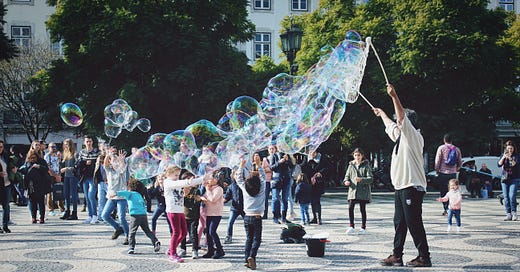You have seen more faces than any of your ancestors before you.
We know that observations on the onslaught of overwhelming news from around the globe in this digital era are nothing new. We hear about this regularly: information overload, compassion fatigue, empathic distress. Human minds and bodies were not built to take in this level of trauma. We cannot handle what we hear, see, or know now.
But what about this sliver of truth, too, buried in a glimmer deep within the bedrock below us:
You have seen more of the imago Dei, the image of God borne by humans.
If you are alive today, you have seen more photos, watched more videos, and read more news than your grandparents did in their entire lifetimes. Between the streets you walk down, the people you meet, and the strangers you see on screens, you have glimpsed and gathered more versions of the human face than anyone could have imagined in centuries past.
The faces.
Look into the faces. See the surroundings in the photographs, sure; of course you can’t miss them. The bombed-out buildings, the rocky rubble, the shells of cars, the crumpled roads, the smoke and ash rising like incense.
But keep peering into the faces. Eyes, ears, nose, cheeks. Hair and skin, muscle and bone. Ask yourself: what is revealed of God here? What reminds me of the faces I love? What is new or unknown? What can I not forget?
To be clear, this is holy labor: hard and edging on impossible. But crossing such borders is exactly what the Holy does. Incarnation blew apart the boundaries we had always known. Now the world is changed for having God walk among us. We cannot forget this. We cannot let our grasp slip on this central truth of Christianity, even as the complex and challenging and staggering and stupefying world continues to confound us by its evil and suffering.
This week I tried to pray with the news. I ran my fingers across the giant map on our wall, echoing the words of the poet: where does it hurt, everywhere everywhere everywhere. But mostly I moved through my days slowly, stuck in the morass of safety and distance, sunk in the mud of my own aches and pains.
Then late one night, unable to bear one more word about war, I turned to another topic—what does it say about our times that an earthquake felt like neutral news—and found the refrain in another’s wail:
They are all of us. They are all of us.
Here is the prayer. This is the truth of humanity: that we must safeguard who we are. Temptations to slip into dehumanization, despair, or deadening anger lurk around every corner, and we are called to keep vigilant watch against them.
Just this morning a car cut me off with a dangerous swipe. I glared with anger through the rainy windshield, blaring the horn as loud as I could. The jerk, I thought, what an idiot—and then I caught myself. Too quick to judge, too rash to rage. Wrong, yes. Yet still a person. Late or lost or caught up in reckless habits, I’ll never know. But a fallible, flawed, frustrated and frustrating human. Just like me.
What does a traffic tussle have to do with violence erupting an ocean away? Nothing and everything. All I can do lies within the small circles in which I live and move and have my being. But I sense the heaviness we share now, once again shouldering the collective burden of how to live in ruthless times like these. We lean on each other, wondering how to keep going, whispering prayers for peace, sharing poetry when prose fails.
Whatever practices ground you in humanity, do those now. Pray for people you hate. Read a poem. Ask unanswerable questions. Light a candle. Ground your prayer in places. Give a glass of cold water to a child. Donate whatever dollars you can.
We have seen much. We will see more. But we do not have to get lost in all that flashes before our eyes. Sometimes, if we squint closely enough, if we listen with the ears of the heart, if we savor the memory of what we share, we can glimpse God within each other’s faces. This changes us. This helps us bring change.
Keep peering into people’s faces. Keep praying the news. Keep crying out.
You have seen so many faces. You cannot lose what they beckon you to see.
If you know my normal practice, I don’t share links within my essays since I learned how our reading minds are distracted by the very sight of that highlighted underline, urging us onward. But in a week where we are inundated by everything crying out for attention, I wanted to offer you a few glimmers of hope: prayers or poems or posts or places working to bring change. When you need, may you return and find a cup of cool water here to refresh your thirst.





What beautiful and profound words, Laura. Thank you for continuing to share your gifts with us in the midst of your own suffering. Praying for you!
Beautiful.